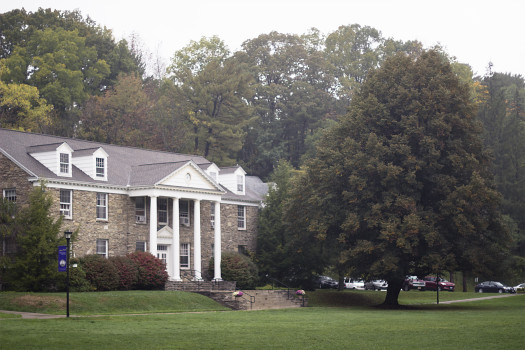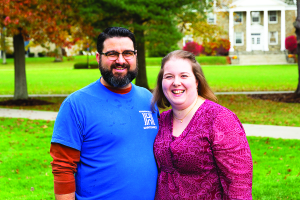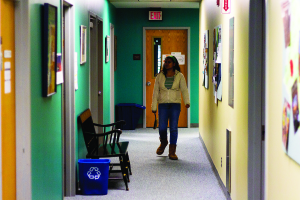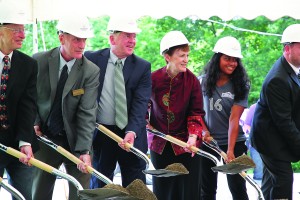Vincent Morris, Houghton College’s new Vice President of Finance, started his first day on the job in September. “I suppose I could be considered part of the incoming ‘class of ’20,’” he joked. “Although I don’t know when—or if—I’ll graduate!” Morris moved to Houghton from Chicago, Illinois, over the summer, and has been pleasantly surprised by the weather thus far, prompting what he described as “naïve doubts about the true ferocity of winter in Western New York.”
Morris’s career path prior to Houghton is eclectic and winding, yet unified by a core passion for students. He “served as a youth minister for an enjoyable decade,” worked at Wheaton College as the Director of Risk Management, and most recently worked as higher education consultant for colleges and universities in the United States and around the world. “I missed the influence for Kingdom work as a single higher education institution,” said Morris. “So I was open to listen when President Mullen suggested I consider joining the Houghton team.”
As the Vice President of Finance at Houghton, Morris is responsible for ensuring that the college’s financial resources are managed efficiently and effectively. “Many, many days [are] spent ’rasslin’ with the budget!” said Morris, adding that a major challenge is attempting to keep tuition “at least sort of affordable” despite ever-rising expenses. He added, “[We] do want to meet payroll and keep the heat and power on for those who want to write a late-night paper or have a Fallout binge or shotgun Netflix shows or bake Christmas cookies or have an RDT or whatever. So that takes resource management.”
Morris serves as part of the president’s staff, a group of core advisors to president Shirley Mullen. The “P-staff,” as Morris calls it, is comprised of vice presidents representing a wide range of college departments and offices, from student life to advancement and external relations. According to Jack Connell, Provost and Dean of the Faculty (as well as another member of the president’s staff), members of this team “collaborate closely together . . . in making the numerous administrative, strategic, and budgetary decisions that are required to operate the college.” Connell described Morris as “curious, creative, energetic, insightful, intelligent, and passionate about Christian higher education,” adding that Morris “brings a tremendous amount of experience and expertise” due to his consulting work with colleges and universities.
In addition to his official responsibilities, Morris has been able to engage personally with the Houghton community during his time here. “A local pastor asked me to a delightful lunch-and-conversation early on,” said Morris. He also added that “Several faculty and staff . . . have graciously invited me into their homes,” gestures he has appreciated doubly because he’s been “batch-ing it” while his wife ties up work at her art studio at Wheaton College.
Morris also played a key role in this year’s Christmas-tree-lighting chapel service at the college. After President Mullen oversaw the lighting of the tree, Morris came up to read “The Best Christmas Pageant Ever,” a book by Barbara Robinson about six unruly, irreligious children, the Herdmans, who secure the lead roles in a church Christmas pageant.
Morris began with a witty self-introduction, confessing to be “that guy at parties, that asks people to punctuate ‘God Rest Ye Merry, Gentlemen,’ and reminds people that we don’t really know that Christ was born on the twenty-fifth of December.” Nevertheless, he asked the audience to suspend their disbelief regarding potential inaccuracies in traditional Christmas pageants, for the purpose of engaging with the story.
And engage they did. The end-of-semester chapel remnant sat spellbound as Morris read for over half an hour. Bursts of laughter bubbled from the audience, as well as the orchestra onstage, as Morris deftly slipped into different voices to suit the characters, from nasally, tough-talking Imogen Herdman to pristinely snotty Alice Wendelken.
When asked what he’d like students to know about him, Morris shared a diverse taste in music, ranging from Beethoven to Mumford and Sons to Pentatonix to the Hamilton soundtrack. He also said that he owns “all the extensions and expansions for ‘Settlers of Catan’ and [has] a very large table in [his] apartment,” as well as “popcorn, cheese, chips, dip, apples, and often some special reserve deep-dish pizza in the freezer too… just sayin’…”
Broke, bored, and hungry college students, take note.




